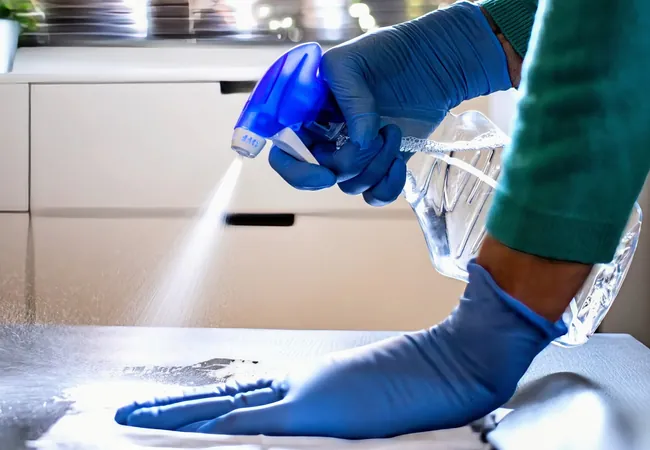
Shocking Discovery: Common Pathogen Defies Hospital Disinfectants!
2024-10-27
Author: John Tan
Shocking Discovery: Common Pathogen Defies Hospital Disinfectants!
In an era where sanitization is paramount, a groundbreaking study reveals unsettling news about our cleaning products. Researchers from Emory University have discovered that a notorious pathogen, Pseudomonas aeruginosa, exhibits surprising resistance against both common household cleaners and hospital disinfectants, raising alarms across healthcare sectors.
P. aeruginosa is known as a significant nosocomial pathogen, often lurking in hospital environments and notorious for its resilience against numerous antibiotics, further complicating infection control. The recent findings from the Emory team expose a troubling reality: the pathogen manages to persist even amid stringent disinfection protocols, which poses a grave threat to patient safety.
The Quest for Superior Sanitation Solutions
Amidst these alarming results, there is a glimmer of hope. The research team has identified several promising biocides that effectively combat P. aeruginosa. Particularly noteworthy is a novel compound developed in partnership with Villanova University, designed to enhance disinfection efficacy against this resilient bacterium. Professor William Wuest, leading the study, anticipates that this discovery will influence new sanitation protocols in hospitals and improve the design of future disinfectants to better tackle these resistant pathogens.
An Overlooked Threat: The Reality of Cleaning Resistance
The study highlights a critical and oft-ignored aspect of infection control: the resistance of pathogens to cleaning agents. The research team emphasizes that this is an urgent area of study, especially given the rising tide of antimicrobial-resistant infections globally. In the United States alone, over 2.8 million such infections occur each year, with more than 35,000 resulting in death. P. aeruginosa specifically has seen a spike in infections during the COVID-19 pandemic.
Globally, this pathogen is responsible for an estimated half a million deaths annually, prompting the World Health Organization to classify it as a critical priority threat. The need for effective disinfectants is clearer than ever.
Promising Developments in Disinfectant Research
The researchers have unveiled a potent new quaternary phosphonium compound (QPC) that shows remarkable efficiency against all tested strains of multi-drug resistant P. aeruginosa. Unlike traditional biocides, which attack both membranes of the bacterium, this innovative compound targets the inner membrane more selectively, hinting at its potential for more effective sterilization techniques.
While the specifics of this selective targeting remain a mystery, the implications for hospitals and high-risk facilities are profound. As hygiene standards come under scrutiny, it is evident that conventional cleaning methods may no longer suffice. Specialized biocides, crafted to combat resilient pathogens, might become essential to safeguard public health.
Looking Forward: A Call to Action for Cleaner Solutions
The revelations from this study challenge the current cleaning protocols in hospitals and other high-traffic environments. It underscores the need for innovative solutions as we face increasingly resilient microbial threats. The findings from Emory University could pave the way for new health regulations aimed at mounting a formidable defense against the silent spread of superbugs.
As we confront the ongoing battle against antimicrobial resistance, this urgent call to action resonates loud and clear: our cleaning solutions must evolve to fend off the pathogens of tomorrow. Stay informed, and join the movement for a safer, healthier future!
This significant study has been published in the journal *ACS Infectious Diseases*, shedding light on the critical intersection of public health and cleaning efficacy.


 Brasil (PT)
Brasil (PT)
 Canada (EN)
Canada (EN)
 Chile (ES)
Chile (ES)
 España (ES)
España (ES)
 France (FR)
France (FR)
 Hong Kong (EN)
Hong Kong (EN)
 Italia (IT)
Italia (IT)
 日本 (JA)
日本 (JA)
 Magyarország (HU)
Magyarország (HU)
 Norge (NO)
Norge (NO)
 Polska (PL)
Polska (PL)
 Schweiz (DE)
Schweiz (DE)
 Singapore (EN)
Singapore (EN)
 Sverige (SV)
Sverige (SV)
 Suomi (FI)
Suomi (FI)
 Türkiye (TR)
Türkiye (TR)